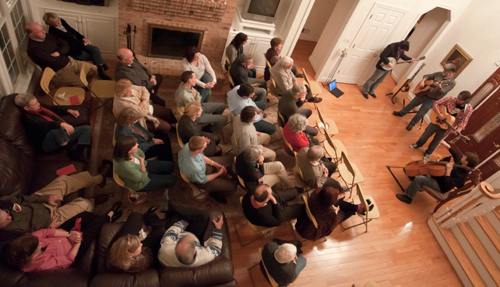
The “house concert” echoes a cultural genre that flourished in 18th century Europe.
Written By Lisa Breslin, Photos by: Walter Calahan
On a clear night under an almost full moon and sharp stars, more than 40 people gathered at Suzanne Olsh-Nida’s home overlooking the Singleton-Matthews Farm in Westminster.
They gathered to hear an amazing range of musical styles and songs, from Burl Ives’ “Wayfaring Stranger,” to Neil Young’s “Cost of Freedom” and “California Blues,” an old Jimmy Rodger’s tune.
At times, the living room filled with the cello’s mellow tone; at others, the space resounded with toe-tapping tunes on the banjo or guitars.
The diverse group – professors, doctors, scientists, lawyers, massage therapists, psychologists, landscapers, musicians, and financial advisors – savored what they had come for: good music in an intimate setting and the opportunity to talk to the artists who performed and wrote many of the songs.
A growing number of Carroll County residents, like Olsh-Nida, are tapping into a unique music scene by opening their doors for house concerts.
The concerts are reminiscent of the cultural salons that flourished among the aristocracy in Europe in 18th century. House concert attendees can count on masterful musicianship and abundant comfort food in pleasant settings.
“Every concert offers an intimate environment, and I just love the opportunity to spend times with friends while hearing great music,” said Westminster resident Lynn Wheeler, who has attended three house concerts.
“Like the European salons, there is an informality to the concerts and people have the ability to be exposed to talented, sometimes less well-known artists,” said Uniontown resident Zoa Barnes. “I love the diversity of the crowds at each concert and the fact that many times people bring a dish, so they are an active part of the community that gathers.”
“Salons lasted in Europe into the 20th century, and they offered a way for middle class folks to participate in the artistic life normally associated with the court, the upper elite,” said Dr. Robin Armstrong, Associate Professor of Music at McDaniel College. “They were also a popular setting for women to participate in arts.”
“But today’s house concerts seem to be different,” said Armstrong. “They signal a return to participation in music as the norm, live music as a community pastime. As the music industry is going through a huge transition, it seems like a logical return to intimate concert settings at a time when the economy has put many concert settings out of business.”
Olsh-Nida’s house concert featured The Ronstadt Generations, an acoustic quartet that features guitarist Michael J. Ronstadt, younger brother of Linda Ronstadt, his sons Petie and master cellist Michael G. Rondstadt, and singer-guitarist Josh Hisle, who recently toured with Neil Young.
The evening, like many house concerts, offered two one-hour sets of music, with an intermission.
“At first I was a little nervous about the logistics involved in offering a private house concert: sending invitations, turning my great room into a mini-concert hall, borrowing and setting up chairs, getting enough folks there, and, ensuring that, as a pot-luck, the food and beverages would vary,” said Olsh-Nida. “But it was easy. What could be better? Cherished friends and delicious homemade food. It was an intimate setting with professional musicians playing top-rate music.”
Uniontown residents Pam Zappardino and her husband, Charles Colyer, hosted some of the earliest house concerts in Carroll County. Over the last eight years, the couple has opened their doors to a variety of musical styles: Rusty and Rhonda Rucker’s blues, the contemporary Irish sounds of Rod McDonald, country blues and old time music created by Andy Cohen and Eleanor Ellis, to name a few.
Attendees have numbered anywhere from 27 to 60 people.
Donation jars are a part of every house concert, and people tend to drop in between $10 and $20. All contributions go to the musicians. For the artists, house concerts offer decent earnings from gatherings that are small detours from their regular road tours.
“A string of house concerts helps the musicians avoid down time between concerts at larger locations,” explained Zappardino. “And they love the communal aspect. There are no barriers that keep them from seeing the audience.”
A common road between many of the house concerts in the county leads back to Common Ground on the Hill, a roots-based, traditional arts, nonprofit organization founded by McDaniel College’s Artist in Residence, Walt Michael. For 17 years, Common Ground has lured a multicultural community of musicians and artisans to the area to play concerts and teach classes.
Many of the musicians who play at Common Ground make return visits for house concerts.
“If folks don’t have an immediate connection to the musicians, they can find out when they are booked at larger places in Baltimore and D.C. and see if they are interested in supplementing their tours,” said Zappardino. “There is no right way to initiate a house concert – you keep it fun and you invite all your friends and your friends’ friends.”
Kathy Mangan, professor of English at McDaniel College, contributed to this story.


